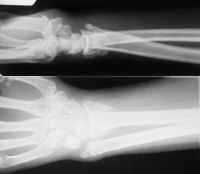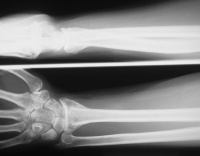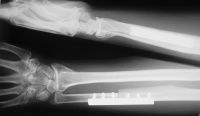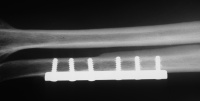Clinical Example: Ulna Rotation Osteotomy for Correction of Forearm Pronation Contracture
|
Pronation contracture of the forearm limits hand-face contact,
perineal self care and other activities. There are many etiologies,
traumatic more common than congenital. Both soft tissue (contracture of
interosseous membrane and pronator muscles, PRUJ and DRUJ capsular
contractures) and skeletal (rotatory malunion) may be responsible, and
correction may require both soft tissue release and skeletal
repositioning. This case demonstrates ulna supination osteotomy as an
adjunct to soft tissue release to manage forearm pronation
contracture following distal radius fracture malunion. |
| Click on each image for a larger picture |
| This patient sustained a
closed distal radius fracture treated in another country. |


| Initial treatment was closed reduction and casting. 18 months later, she presented with loss of forearm supination past neutral and ulnar head prominence and pain. |

| After release of both
pronators from the radius and release of the distal half of the
interosseous membrane, passive supination was unchanged. A 60 degree
ulnar supination and 2 mm shortening osteotomy was performed,
with nearly 60 degrees improvement of supination intraoperatively. |


| Ulnar styloid position on a
forearm AP radiograph demonstrates the degree of rotation |

| Uneventful healing. Final
supination was 45 degrees. |

|
Search for... Case Examples Index Page |
e-Hand home |